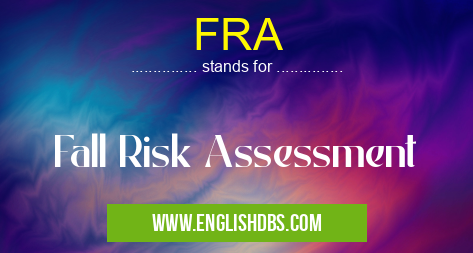What does FRA mean in UNCLASSIFIED
Fall Risk Assessment (FRA) is a crucial evaluation process that identifies individuals at high risk of falling. It assesses various factors that contribute to a person's risk of experiencing falls, including physical, cognitive, and environmental factors. By conducting a thorough FRA, healthcare professionals can develop tailored interventions to minimize fall risks and enhance the safety and well-being of individuals.

FRA meaning in Unclassified in Miscellaneous
FRA mostly used in an acronym Unclassified in Category Miscellaneous that means Fall Risk Assessment
Shorthand: FRA,
Full Form: Fall Risk Assessment
For more information of "Fall Risk Assessment", see the section below.
Components of FRA
An FRA typically involves a comprehensive assessment of the following components:
- Physical factors: These include assessing muscle strength, balance, gait, and mobility.
- Cognitive factors: Cognitive impairments, such as confusion, memory loss, and attention deficits, can increase the risk of falls.
- Medical history: Reviewing a person's medical history can reveal underlying conditions that contribute to fall risk, such as neurological disorders, cardiovascular issues, or musculoskeletal impairments.
- Environmental factors: Assessing the person's living environment for potential hazards, such as slippery floors, inadequate lighting, or cluttered walkways, is crucial.
- Medication use: Certain medications, such as sedatives and antipsychotics, can impair balance and increase fall risk.
Benefits of FRA
Conducting FRA offers numerous benefits, including:
- Early identification of fall risk: Identifying individuals at high risk of falling allows healthcare professionals to intervene early on to prevent falls and minimize their consequences.
- Targeted interventions: FRAs help tailor interventions to address specific risk factors, ensuring effective fall prevention strategies.
- Improved patient outcomes: By reducing the risk of falls, FRAs contribute to improved health outcomes for individuals, preventing injuries, hospitalizations, and long-term complications.
- Cost savings: Preventing falls can lead to significant cost savings by reducing the burden on healthcare systems and avoiding the expenses associated with fall-related injuries.
Final Words: Fall Risk Assessment (FRA) is an invaluable tool in identifying individuals at high risk of falling. By conducting a thorough FRA, healthcare professionals can develop tailored interventions that effectively reduce fall risks, promote safety, and enhance the quality of life for these individuals. Incorporating FRAs into routine healthcare practices is crucial for ensuring optimal patient outcomes and minimizing the burden of falls on individuals and healthcare systems.
FRA also stands for: |
|
| All stands for FRA |
